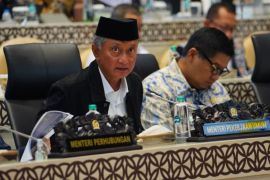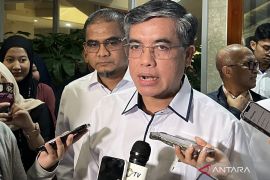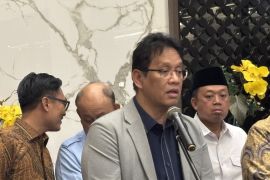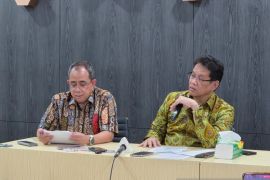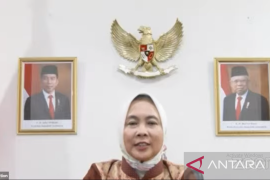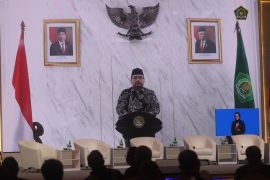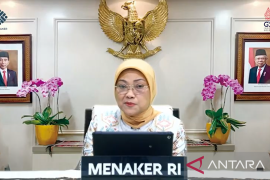In the fourth quarter of 2021, the economy expanded 1.06 percent qtq (quarter-to-quarter). Year-on-year (yoy), the economy clocked a growth of 5.02 percent.
Cumulatively, the economy grew 3.69 percent throughout 2021.
Although the economy contracted 0.74 percent (yoy) in the first quarter of 2021, it performed far better than in 2020 when the spread of COVID-19 exerted massive pressure on the economy.
The national economy rebounded to show a growth of 7.07 percent (yoy) in the second quarter of 2021, given that the baseline recorded during the same quarter of the previous year was very low—at minus 5.32 percent (yoy).
However, numerous challenges still exist that can potentially stymie the government's efforts to keep the economy on the path to recovery from the COVID-19 crisis.
Finance Minister Sri Mulyani Indrawati said that economic recovery will not be a smooth and easy process.
There are several challenges that can cause shocks in the recovery path, Indrawati noted.
Indonesia has begun to experience recovery and is returning to the path to development goals and ideals, she noted.
The recovery began as a result of the government's efforts to conduct structural, fiscal, and state budget reforms, among others.
The minister drew attention to several challenges that could potentially shake up Indonesia's recovery trajectory, including the uneven transition from the pandemic to endemic phase in several regions in Indonesia.
Other challenges include the ongoing geopolitical turmoil that has led to an extreme spike in commodity prices and global supply chain disruptions, creating high global inflationary pressures.
The threat of climate change can also likely impede recovery, so it must be responded to early and carefully with the help of technology, policy, and finance.
Indrawati also assured that the government will continue to maintain the health and reliability of the state budget, which is an important instrument for development and protects Indonesia from the impacts of a deeper crisis.
Efforts to maintain the health of the state budget are being made so that the instrument can continue to be a solution for dealing with various development challenges and turmoil as well as crises that could likely occur in the future.
She said that the Indonesian government has spent around US$45.9 billion, or 23.6 percent of the total expenditure in 2021, on economic recovery
The handling of COVID-19, for which large amounts of money was funneled, finally succeeded in boosting Indonesia's economic growth in 2021 after a contraction of 2.07 percent in 2020, Indrawati noted.
She affirmed that recovery was seen in all sectors, in terms of production, supply and demand, as well as exports, which were strongly driven by global recovery.
Strong growth also occurred in some very important sectors, such as manufacturing, trade, and mining, owing to rising commodity prices. Indonesia's economic output also exceeded pre-pandemic levels.
The minister emphasized that these positive developments have made Indonesia one of the developing countries scripting a fast recovery.
This achievement that was recorded as the basis for recovery during this pandemic was much faster than Indonesia's recovery after the 1997–1998 financial crisis, she noted.
The minister assured that the government will continue to apply policies effectively, as the recovery process is still ongoing and will continue to need fiscal support.
Global economic recovery
Meanwhile, Bank Indonesia Governor Perry Warjiyo highlighted the need for joint coordination (recovering stronger, recovering together) to maintain the global economic recovery momentum.
Moving forward, Governor Perry emphasized three key measures to welcome a new civilization in terms of coordinated G20 leadership.
First, cooperation in health through the provision of assistance to countries with inadequate access to vaccines. Second, overcoming current issues, namely policy normalization in advanced economies, to ensure countries recover together. And third, achieving stronger growth together by addressing future issues that are beginning to emerge, such as productivity, digitalization, and the environment.
The importance of an optimal policy approach to normalization and the scarring effect, which continue to loom over the global economy, was raised at the discussion.
The policy response must narrow the productivity gap by enhancing workforce skills and competencies, supporting the expansion of intangible assets in digital transformation, and unlocking access to dynamic markets, such as digital-based industries, he said.
In terms of digitalization, the challenges include inclusive finance and the development of digital currencies.
The financial sector is playing an essential role in sustaining recovery momentum by absorbing shocks, facilitating the transition towards a green economy, enhancing productivity through new payment methods, and disbursing inclusive finance.
Furthermore, Warjiyo said that financial intermediation, financial technology innovation, and climate change issues are the three salient aspects of recovery.
The lessons learned from the 2008 crisis and the COVID-19 pandemic have reinforced the importance of strengthening financial system resilience.
Both shocks have provided a greater understanding concerning the significance of market liquidity in supporting the intermediation function.
Financial system integration is increasing, with international organizations, such as the Financial Stability Board (FSB), analyzing the financial system holistically for existing vulnerabilities, including climate change risk.
Furthermore, we need to anticipate financial sector challenges, including the risks associated with normalization, the scarring effect, and excessive risk-taking, which demand vigilance, he said.
Related news: Youth in Y20 expected to bolster inclusive economic recovery: Hartarto
Related news: Vital to ensure all countries recover together: minister
Related news: Govt encourages Urban 20 to formulate economic recovery-centric policy
Editor: Sri Haryati
Copyright © ANTARA 2022

